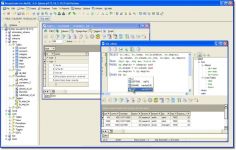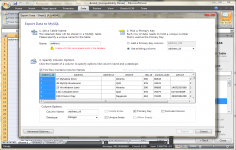 MySQL 5.0.88
MySQL 5.0.88
MySQL AB - (Open Source)
MySQL is a successful open source database used in most web applications, e-commerce and online transaction processing.
MySQL is one of the world's most famous and used open source database. The software can be used to manage web applications, e-commerce and online transaction processing since MySQL database incorporates support those transactions. It is also commonly associated with PHP when it comes to managing websites.
With standard JDBC , ODBC, and Net, the developer can choose the programming language. MySQL has the advantage of working with almost all the popular operating systems and communicate easily with programming languages ​​such as C, C + +, VB, C #, PHP, Python, Ruby, Java, Perl, Eiffel, etc.MySQL replication allows you to create profitable applications. In addition, it enables the development of typologies replication complex and massive chain.Its reliability and robustness, performance, ease of use makes MySQL have more success than anticipated.
- Title:
- MySQL 5.0.88
- File Size:
- 29.6 MB
- Requirements:
- Windows 9x / 2000 / XP / Vista / Windows7 / Windows8
- Language:
- en-us
- License:
- Open Source
- Date Added:
- 20 Nov 2009
- Publisher:
- MySQL AB
- Homepage:
- http://www.mysql.com
- MD5 Checksum:
- 34EAC241168A68305AD6B54BAA0671DF
# Bugs fixed:
* Security Fix: MySQL clients linked against OpenSSL did not check server certificates presented by a server linked against yaSSL. (Bug#47320)
* MySQL Cluster: When a data node had written its GCI marker to the first page of a megabyte, and that node was later killed during restart after having processed that page (marker) but before completing a LCP, the data node could fail with filesystem errors. (Bug#44952)
See also Bug#42564, Bug#44291.
* Replication: When a session was closed on the master, temporary tables belonging to that session were logged with the wrong database names when either of the following conditions was true:
1. The length of the name of the database to which the temporary table belonged was greater than the length of the current database name.
2. The current database was not set.
(Bug#48216)
See also Bug#46861, Bug#48297.
* A query containing a view using temporary tables and multiple tables in the FROM clause and PROCEDURE ANALYSE() caused a server crash.
As a result of this bug fix, PROCEDURE ANALYSE() is legal only in a top-level SELECT. (Bug#48293)
See also Bug#46184.
* Error handling was missing for SELECT statements containing subqueries in the WHERE clause and that assigned a SELECT result to a user variable. The server could crash as a result. (Bug#48291)
* An assertion could fail if the optimizer used a SPATIAL index. (Bug#48258, Bug#47019)
* A combination of GROUP BY WITH ROLLUP, DISTINCT and the const join type in a query caused a server crash when the optimizer chose to employ a temporary table to resolve DISTINCT. (Bug#48131)
* mysys/mf_keycache.c requires threading, but no test was made for thread support. (Bug#47923)
* If the first argument to GeomFromWKB() function was a geometry value, the function just returned its value. However, it failed to preserve the argument's null_value flag, which caused an unexpected NULL value to be returned to the caller, resulting in a server crash. (Bug#47780)
* The GPL and commercial license headers had different sizes, so that error log, backtrace, core dump, and cluster trace file line numbers could be off by one if they were not checked against the version of the source used for the build. (For example, checking a GPL build backtrace against commercial sources.) (Bug#46216)
* During the build of the Red Hat IA64 MySQL server RPM, the system library link order was incorrect. This made the resulting Red Hat IA64 RPM depend on "libc.so.6.1(GLIBC_PRIVATE)(64bit)", thus preventing installation of the package. (Bug#45706)
* Failure to treat BIT values as unsigned could lead to unpredictable results. (Bug#42803)
* In a replication scenario with innodb_locks_unsafe_for_binlog enabled on the slave, where rows were changed only on the slave (not through replication), in some rare cases, many messages of the following form were written to the slave error log: InnoDB: Error: unlock row could not find a 4 mode lock on the record. (Bug#41756)
Related software
2.1/5 from 178 users


